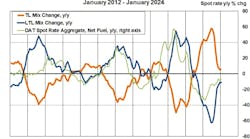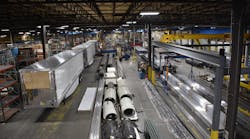Sales for all models of trailers remain strong this year and could remain so in 2013 if fuel prices start to moderate, among other factors, according to Craig Bennett, senior VP-sales and marketing for Utility Trailer Manufacturing Co.
“We’ll have a record this year if the sales pace we’ve experienced so far continues; we may even approach [sales] levels we last saw in 2006,” Bennett said.
“We’ve had a very strong 2012 so far, with dry vans and refrigerated trailer models selling well and the flatbed [trailer] market finally recovering due to renewed demand from the oil field and agricultural sectors,” he pointed out. “We could also have a really good 2013 but that depends on the outcome of the presidential election in November and if fuel prices begin to moderate.”
Bennett explained that most direct impact of the presidential election on the trailer market will be whether it results in forward movement on the long-delayed highway bill. Indirect impacts from the election revolve around tax policy, he added, as tax increases could crimp trailer sales volumes.
So far, however, Bennett said Utility is experiencing robust volumes to the point where it’s now expanding manufacturing capacity.
“The dry van market in particular is very active so we’ve added a second shift to our Glade Spring VA plant,” he noted; resulting in the hiring of 70 employees and adding 56,000 square feet to the facility so it can produce an extra 2,000 trailers per year. “If we could build more trailers faster, we’d be happy.”
Bennett added that Utility has already added 100 extra positions at its flatbed manufacturing plant as well this year to keep up with demand.
From a trailer design perspective, he noted that Utility will continue to focus on making its products lighter where possible for a number of reasons.
“Due to the addition of emission control system technology between 2003 and 2011, trucks have gotten a lot heavier,” Bennett said. “So the onus is on trailer manufacturers to make our products lighter. Customers are also trying to put more freight on trailers, too, to help deal with higher fuel prices and the increasing shortage of drivers.”
In other news, Utility is trying to standardize what it calls “sustainable trailer manufacturing” practices; efforts that to date have helped it reduce levels of volatile organic compounds (VOCs) by 20% and hazardous air pollutants (HAPS) by 87% at its facilities. Bennett said the company’s goal is to achieve a near-zero level of landfill waste from its production factories.
The company also offering Kinedyne Corp.’sK2 Kaptive Beam double-stacking freight loading system as an option for its dry van models; a system that adds roughly 500 to 600 pounds to the trailer.
Related content: Leading builders boost trailer manufacturers output 78% to almost 216,000 trailers in 2011








